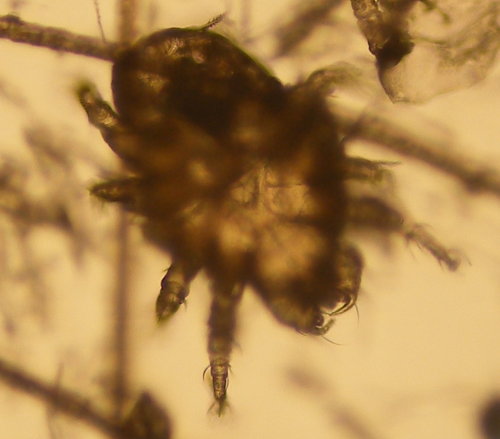Difference between revisions of "Clinical Case 6 - Page 3"
Jump to navigation
Jump to search
(New page: <big><center>'''BACK'''</center></big> Courtesy of C. Antonczyk This image is as viewed under the x10 objective. [[Image:Clinical Case 6 04.jpg|thumb|center...) |
|||
| Line 6: | Line 6: | ||
[[Image:Clinical Case 6 04.jpg|thumb|center|500px|(Courtesy of C. Antonczyk)]] | [[Image:Clinical Case 6 04.jpg|thumb|center|500px|(Courtesy of C. Antonczyk)]] | ||
| + | |||
| + | What is this? | ||
| + | *<font color="white"> This is a mite. It has long legs, making it a surface mite. It also has large claw-like palps, identifying it as a ''Cheyletiella'' sp. ''Cheyletiella yasguri'' is the most common species on the dog, but this mite is not completely host specific. Bear in mind that ''Cheyletiella'' spp. may be an incidental finding, so if there is any suspicion of another skin problem, particularly demodecosis, a skin scrape should be performed. </font> | ||
| + | |||
| + | Can this condition affect the owner? | ||
| + | *<font color="white"> Yes. Owners may develop red papules in areas of prolonged contact with their pets, often on the chest and abdomen, as well as the arms. </font> | ||
| + | |||
| + | How is this condition treated? | ||
| + | *<font color="white"> There is no licenced treatment for cheyletiellosis. Various treatments can be used, including fipronil spray and selamectin. As well as treating the affected animal, any in-contact animals should be treated. The environment must also be treated with an effective flea spray. The affected animal may benefit from shampooing with selenium sulphide shampoo. </font> | ||
| + | |||
| + | |||
| + | |||
| + | <big><center>[[Case Studies|'''BACK TO CASE STUDIES''']]</center></big> | ||
Revision as of 20:48, 30 January 2008
Courtesy of C. Antonczyk
This image is as viewed under the x10 objective.
What is this?
- This is a mite. It has long legs, making it a surface mite. It also has large claw-like palps, identifying it as a Cheyletiella sp. Cheyletiella yasguri is the most common species on the dog, but this mite is not completely host specific. Bear in mind that Cheyletiella spp. may be an incidental finding, so if there is any suspicion of another skin problem, particularly demodecosis, a skin scrape should be performed.
Can this condition affect the owner?
- Yes. Owners may develop red papules in areas of prolonged contact with their pets, often on the chest and abdomen, as well as the arms.
How is this condition treated?
- There is no licenced treatment for cheyletiellosis. Various treatments can be used, including fipronil spray and selamectin. As well as treating the affected animal, any in-contact animals should be treated. The environment must also be treated with an effective flea spray. The affected animal may benefit from shampooing with selenium sulphide shampoo.
